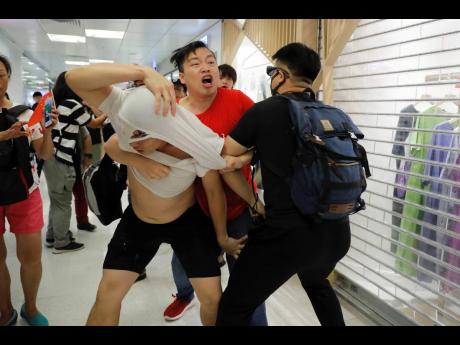Walter Molano | China: Bad memories
The fiery protests in Hong Kong are a tremendous headache for Beijing. The images of thousands of black-clad, middle -class kids, converging into the heart of the financial district in order to confront the police, strike pangs of fear deep into the hearts of senior party officials in Beijing.
Up to recently, Hong Kong was the preview of what China would look like in the near future; modern, prosperous and self-assured. It was paradise for anyone who wanted to work hard. Fortunes were made, and there were endless stories of people who became astronomically rich after starting with nothing.
Unfortunately, the city fell victim to its own success. The endless stream of arriving mainlanders seeking a better life pushed wages down and rents up. Untenable prices forced young people into tiny apartments in squalid neighbourhoods. The city became a powder keg looking for a catalyst to explode.
The spark appeared when Chief eExecutive Carrie Lim unilaterally introduced a bill to facilitate the extradition of suspected criminals to mainland China. The city had become an outpost for shady mainlanders looking to escape the law, and it was starting to become a problem. Therefore, the city government wanted to streamline the extradition process.
It became the unexpected detonator that was needed to bring the social cauldron to a boil. It was the excuse for people to vent their anger in a state where there was no representative process. Millions took to the streets, and there were pitched battles with the police throughout the city.
Although Beijing had troops at the ready in neighbouring Shenzhen, it was in no hurry to engage. Hong Kong is supposed to be fully integrated into China by 2047, but it will probably retain a great deal of independence. China needs Hong Kong to stay that way, so it can remain the country’s financial centre. A rules-based legal system is the key to creating any financial hub.
However, the Communist Party plays a direct role in the Chinese legal system, and it will never become a rules-based system. Therefore, Beijing needs Hong Kong to continue to play that key role with its well-established and well-respected courts system. This way, Chinese companies and entrepreneurs can continue to raise the capital they need to fund the county’s economic growth and activity.
So, why is Beijing so worried about Hong Kong?
History plays an important role in Chinese political thought. Chinese leaders always reference the past to try to understand the future. This is why the image of millions of black-clad youths marching through the streets of Hong Kong and taking on the police was so terrifying. There have been many spontaneous uprisings that have exploded into bloodbaths and revolutions.
Chinese society is susceptible to the influence of cults, which have pushed the population in unexpected directions. One example occurred in 1899, when a cult of martial arts enthusiasts, known as the Militia United in Righteousness, mobilised into a nationwide civil war that claimed more than 100,000 lives. Commonly known as the Boxer Rebellion, it was spurred by an economic downturn due to a drought in the grain-growing northern provinces.
However, a better example occurred in the late 1850s and early 1860s, during the Taiping Rebellion, when a charismatic and economically frustrated young man, Hong Xiuquan, created a religious-based cult that took on the Qing Dynasty. More than 30 million people perished during the revolt, making it the bloodiest civil war. Even Mao’s Cultural Revolution took on a life of its own that needed to be put down.
Therefore, it is normal for party officials to worry about the uprising in Hong Kong. These are the reasons why Beijing keeps close tabs on social media and the press. With a population of more than 1.3 billion, any social movement can easily grow to a scale that is uncontrollable.
The other problem is that the economic woes in Hong Kong are a precursor of what lies ahead for China. It is natural that a country’s growth rate slows as it reaches middle-income status.
According to the Solow Growth Model, equilibrium GDP should stabilise at the population’s growth rate. The issue is that China’s population growth rate is negative, due to the one-child rule that was implemented during the early 1980s. On top of that, measures to curb the shadow banking system, along with Trump’s trade war, are adding to the pain. And high pork prices and the weakening currency are sapping purchasing power, and many young mainlanders feel that they will never achieve the same success their parents.
Like Hong Kong, a social-economic cauldron is simmering in the mainland and all that is needed is an unintended spark for it to explode.
Dr Walter T. Molano is a managing partner and the head of research at BCP Securities LLC.wmolano@bcpsecurities.com

